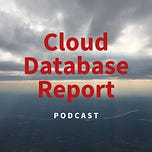On this episode of the Cloud Database Report Podcast, I talk with Mark Cusack, CTO with Yellowbrick Data, about the fast growing market for cloud data warehouses. Our conversation explores the key considerations for a "cloud-native" platform, including the separation of storage and compute resources.
Yellowbrick is a 7-year-old startup that continues to grow in the highly competitive cloud data warehouse market. Yellowbrick recently raised $75 million in its latest round of capital funding as it expands into a variety of industries, including telecom, healthcare, retail, and manufacturing.
Yellowbrick describes itself as a cloud-native data warehouse. It is available for deployment on premises and in hybrid cloud and multi-cloud environments.
Key topics from the interview include:
What make a database or data warehouse cloud native? APIs, open source, storage tiers, networking. How does Yellowbrick define it?
One of the key things with cloud-native data warehouses is the separation of storage and compute. It gives you scalable storage and dynamic compute resources.
Not all approaches to storage/compute are the same. Yellowbrick has published a white paper that defines six different levels of storage/compute separation.
There are performance and workload advantages, but also important considerations around cost.
Quotes from the podcast:
"The separation of storage and compute is table stakes for cloud data warehouses today."
"The ultimate goal is a data warehouse that provides the same cloud experience wherever you need to deploy it for business needs or business reasons. That could be data sovereignty, data gravity, regulations, security, latency and things like that, but provide the same easy-to-consume experience throughout."
"We're addressing two problems: One, software in data warehouses is not as efficient as it could be. And second, there's a lot of unpredictability around the costs of running these systems."
"Democratization of data and analytics is a key trend. And making a self-service experience for line-of-business users is critical."











